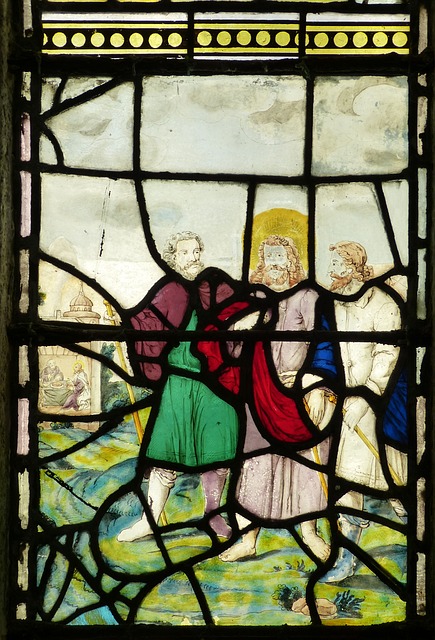On the road to Emmaus
Upon breaking the bread
So while conversing, they reached the village, still wrapped by the first shadows which the hills were rapidly pushing down. Having reached their destination, the two disciples stopped by, and the other was ready to continue onwards. But they “forced” him, according to the customs of hospitality, which had become stricter by the lessons learned from Jesus, and also by the discourse of the stranger. So he entered their home, and sat at the table with them. When dinner was served, he took the bread, blessed it, and breaking it, offered it to them. With that gesture, almost as if scales had fallen from their eyes, their vision opened and they recognized: Jesus! Amazed, they stood up to go closer but he disappeared. It was then that the disciples were invaded by a feeling of immense peace, which was a harbinger of new joy, and they finally understood.
“Did not our hearts burn within us while he talked to us on the road, and he opened to us the Scriptures?” (Luke 24: 13-32)
A sign of the closeness of Jesus, therefore, for the disciples, was that their hearts burned. How can we stay by the flame without burning?
Igino Giordani, Jesus Nazareth, SEI ed., Turin1950, pp. 382-383.
The miraculous catch
In the evening, those in Capharnaum went fishing. The love they all shared for the Messiah also led them to work together. They got on the boat and sailed on the waves, throwing the net into the waters where the light of the stars broke into a silvery powder. The breeze rocked the boat, and the thought of the Master rocked their spirits. Every now and then they pulled up the net but to no avail, and the whole night they labored for nothing. They were tired. Suddenly with first ray of dawn, Jesus appeared to them from the shore, but they didn’t recognize him. Now that he belonged to a humanity that had surpassed death, the Lord hid his glory and so to say, his physical identity, compressing his beauty so as not to allow its splendor to strike them down or scare them, so much so that this compressed evanescence also masked his physical traits.
“Young lads, he said (and his voice was full of strength and joy), young lads, have you got any fish?” “No!” – they answered. They were fishermen who had fished in vain. “Throw the net on the right side of the boat – the stranger said: and you will catch them.”
So all of a sudden, a great school of fish appeared, and a cloud of fish fell into the net’s weft.
Igino Giordani, Jesus of Nazareth, cit., pp. 385-386.
Peter’s profession
For the third time, Jesus repeated his question to the apostle: “Simone, son of John, do you love me?” Peter was saddened by this insistence and burst out: “Lord, you know all, and you know that I love you.” And Jesus solemnly said to him: “Feed my sheep.” And then added: “Follow me!”
Peter followed him and also John trailed him, and Peter on seeing him, asked the Lord to tell him what the destiny of this young disciple would be. “If I want him to remain until I return, what would it matter to you? Come, follow me.”
It was so that the rumor passed among the brothers that John would not die. He certainly lived longer than all of them, to testify that Jesus, as God, allowed him to live, despite the deportations and persecutions. He conferred on them their certainties, reinforcing them in an investiture. Then Jesus disappeared, assumed in glory.
Igino Giordani Jesus of Nazareth, cit., pp. 387-388.
The fascination of Jesus
His face released an overwhelming power, and his body, a healing Energy. Upon seeing him the woman could not hold back a cry of admiration for the unique mother that had generated him, and had stood at his feet, enchanted to listen to him. And the sick and sinner sought him with their eyes, and instinctively felt that he could heal their sick flesh and guilty consciences.
His gait was unusual. He wanted to sweep sin away from the world, and spoke with adulterous women and dined with infamous men. Where people gave importance to riches, he beatified poverty.
There was originality in his actions and in his speech, which those spirits could not understand. They did not understand because they could not accept the divinity of the man: his grandeur, the extraordinary novelties were in fact, the effects of his divinity.
Igino Giordani, Jesus of Nazareth, cit., p.393.




